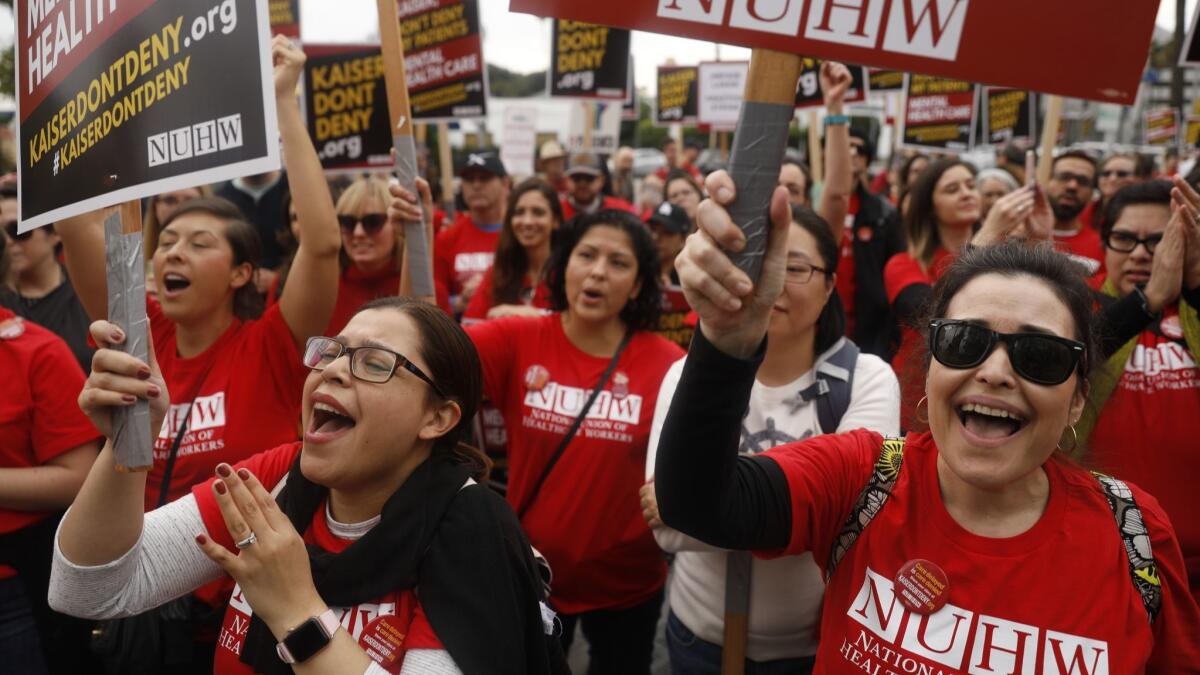Kaiser Permanente mental health workers begin weeklong strike

About 4,000 Kaiser Permanente mental health workers are taking part in a weeklong strike that began Monday at facilities throughout California as their union negotiates for a new contract.
The workers on strike include licensed clinical social workers, marriage and family therapists, psychologists, medical social workers and psychiatric nurses who are part of the National Union of Healthcare Workers. The union has called for smaller patient-to-therapist ratios, fewer patient referrals to therapists outside the Kaiser network and, in some cases, increased staffing. Its latest contract with Kaiser expired in September.
For the record:
4:10 p.m. Dec. 11, 2018An earlier version of this story said about 1,500 Kaiser Permanente mental health workers were expected to strike. The number of striking workers is about 4,000, and a union spokesman said more than 1,500 picketed Monday.
Kaiser said all of its hospitals and medical facilities will be open during the strike, though some non-urgent services are being rescheduled.
The Oakland-based health maintenance organization, which reported a net income of $3.8 billion last year, provides health insurance coverage to 11.8 million people.
More than 1,500 workers picketed Monday, said Matthew Artz, a spokesman for the union.
Elizabeth White, a licensed clinical social worker in the psychiatry department at a Kaiser clinic in Los Angeles’ Baldwin Hills/Crenshaw neighborhood, said her patients sometimes have to wait four weeks between appointments. Wait times at some Kaiser medical offices have improved over the years, but patients need more frequent appointments, she said.
“Without that type of intervention, people drop out,” said White, a 20-year Kaiser veteran.
In 2014, Kaiser paid a $4-million fine to settle allegations from the California Department of Managed Health Care that the HMO inadequately treated mental health patients. Among the state’s allegations was that patients sometimes had to wait more than two to three weeks to see therapists for initial and follow-up appointments.
Since then, Kaiser said it has invested $93 million to refurbish existing mental health facilities and spent $175 million to build 13 new ones. The HMO said it has also increased mental health staffing by 30% since 2015 and that wait times have shrunk to about two weeks.
While wait times can occasionally be longer, Kaiser is “pretty consistently meeting those standards” of two weeks, said Annie Russell, chief operating officer for Kaiser’s Southern California region.
She said the HMO also can do preliminary phone screenings to identify patients who need immediate intervention.
“The demand for mental health services has exploded, and keeping up with that demand is our highest priority,” she said.
To that end, Kaiser has referred patients to outside therapists. Russell said all those therapists are licensed by the state and qualified to provide care.
“Of course our interest is always to keep the work inside when possible,” she said. “But in cases where we have high demand, we absolutely will ensure Kaiser Permanente members get access to care.”
The California Nurses Assn. and the Stationary Engineers Local 39, which represents hospital power plant workers, have given their members strike sanction, which allows them to decide on an individual basis whether to join the picket lines.
Twitter: @smasunaga
More to Read
Inside the business of entertainment
The Wide Shot brings you news, analysis and insights on everything from streaming wars to production — and what it all means for the future.
You may occasionally receive promotional content from the Los Angeles Times.











